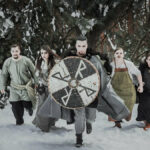Othala is an Estonian musician project with roots from Ukraine and takes us into a well of music based on history and stories and allows us to feel the past in a language we understand through our emotions and senses….
I am happy that you have found the time for this written interview, and we are all looking forward to hear more about your life and music
Would you like to tell us a little about yourself?
I am originally from Ukraine, I am 42 years old, and my name is Dmytro. Until recently, our life was going on as usual, but unfortunately, the war that Russia started against Ukraine changed everything. My family and I were forced to leave our home and move to Estonia, where we are now trying to start a new chapter of our lives.
It was not an easy decision, but our priority was the safety and future of our children. Estonia has welcomed us very warmly, and we are grateful for the opportunity to be here during this difficult time for us.
What does “Othala” mean and does the name mean something special for you?
The name “Othala” carries powerful symbolism. This rune represents heritage, ancestral roots, and a connection to home—not in a physical sense, but in a spiritual one. In situations where people are forced to leave their homeland due to migration or tragic circumstances such as war, it is cultural heritage and traditions that remain constant, regardless of any changes. The music we create in the “Othala” project embodies this idea. We believe that our roots are not just a physical place but also the songs, stories, and rhythms passed down from generation to generation. Even when a person leaves their homeland, these cultural codes stay with them, continuing to live in their soul, and through music, they can share them with the world. Our project serves as a reminder that, no matter where we are, we are always bearers of our heritage. Music helps to preserve this connection to native traditions, despite borders and distances. “Othala” symbolizes this constant connection to our ancestors, to our cultural roots, which cannot be lost even if life takes us far from home. Music becomes the bridge that unites us with our roots, and through it, we carry our culture forward, creating a space for dialogue between the past and the present, between our homeland and the place where we find ourselves now.
How long have you been producing music?
Music has always been an important part of my life. I started playing music when I was eight years old, and since then, it has accompanied me every step of the way. After finishing school, I participated in various musical projects, played in different bands, and it’s safe to say that I’ve been connected to music for over 30 years. However, the “Othala” project has become a particularly significant milestone for me.
And how did it start for you with producing music and how was your journey?
I had never created purely folk music before. My musical career has always been tied to experimentation, and I have worked in a wide variety of genres. There were projects where I composed hybrid music, combining ethnic elements with rock sounds or incorporating them into electronic tracks. However, the real push toward immersing myself in ethnic music came when I was commissioned to create music for meditation. While working on this project, I began to explore ethnic traditions more deeply, their melodies, and unique sounds, and it was then that I realized how powerful music based on the roots of folk cultures can be. This experience literally “carried” me into the world of ethnic music, opened new creative horizons, and became the foundation for my future musical journey.
As of now, the Othala project remains an exclusively studio project. It allows me to fully focus on developing the sound and exploring the depths of ethnic music without the pressures of live performances.
Do you make other kinds of music than what we know you for now a days?
Yes, at the moment I have two more projects in development. These projects are in a completely different stylistic format, distinct from what I’ve worked on before. They open new horizons for my creativity, allowing me to experiment with various genres and approaches to music. However, at this stage, I prefer not to reveal all the details—not because it’s a secret, but rather because everything has its time.
When a project is just beginning, it needs space for natural development so that it can find its own uniqueness. These ideas are still taking shape, and I want to keep them in silence until they are fully mature. I’m confident that when the right moment comes, they will surprise listeners with their freshness and originality. But for now, it’s something personal and creative that I’m nurturing and developing.
Have you ever been in a band?
Yes, of course. Throughout my musical journey, I have played in several bands, each with its own unique style and sound. I have always sought diversity and never confined myself to the boundaries of a single genre. I was fortunate to be part of projects that covered a wide range of musical directions—from rock music to electronic, from experimental sounds to ethnic elements.
Each band and each style contributed to my understanding of music and to the development of my creative approach. It was not just about performing—it was a deep exploration of music as a phenomenon, capable of being so different yet still bringing people together. These projects helped me expand my perception, and now all these styles and genres have become the colors with which I create my music.
Do you sing?
To be honest, calling myself a vocalist feels almost like a joke. But apparently, if I have to open my mouth and produce sounds in the studio, it seems I can be considered to have some involvement in that role. Though, to be honest, it’s the part of the musical process I enjoy the least. In the studio, it’s easier, of course—no one sees me doing it with a slight sense of embarrassment. For me, singing is more of a necessity than a desire. Sometimes a song simply demands that my voice becomes another instrument, and there’s no other option. I’m definitely not one of those who dreams of big solo parts, but if the melody persistently hints that my voice is needed, I end up recording.
Thankfully, in the studio, I can redo takes, take a break, and mentally prepare, so I don’t risk scaring anyone with my vocals live—at least, not until we’re doing concerts. So, my voice in the project is more a tool for conveying emotions than a reflection of vocal ambitions. Sometimes I have to sing, and it’s like an added bonus in the recording, but honestly, I prefer it when the instruments “sing” for me!
Have you made collabs and with whom?
At the moment, I don’t have any full-fledged collaborative projects, but there may be an interesting opportunity coming up soon. We are discussing a trial collaboration on one track with an Estonian rock-folk band. It’s still at the negotiation stage, and I can’t reveal any details yet—everything is in the early stages. But the very fact that there is such a prospect is already inspiring.
Would you like to do collabs?
Collaborations are always an interesting and exciting process, but they are also full of nuances and challenges. When two artists come together, it’s like two different worlds trying to merge into one work of art. Sometimes this leads to amazing discoveries and new creative heights, and other times—well, how to put it… into a bit of creative chaos.
Of course, I’m always open to collaborations, but I must admit, I approach them with caution. The most important thing is to find common ground and avoid a situation where one disagreement could escalate into a serious conflict. I really dislike conflicts! Sometimes it feels like, in moments like these, it’s important not only to create something new but also not to damage the friendship in the process. So, when I agree to a collaboration, it’s a bit like walking on eggshells—you try to do everything carefully so as not to step on anyone’s toes.
After all, music is about enjoyment and creativity, not about figuring out whose guitar sounds cooler. For me, the key is to maintain harmony and avoid unnecessary tensions.
Do you have a favorite track yourself or maybe a band?
Oh, I have so many favorite bands and tracks that if I start listing them, I’m afraid this interview might turn into a massive playlist! But when it comes to folk music, it probably won’t surprise anyone if I say that names like Wardruna and Heilung are definitely on my list. These bands create an incredible atmosphere where every sound seems to breathe with ancient traditions. They are true masters at conveying the spirit of antiquity through music.
However, the majority of what I listen to is probably world ethnic music. I’m fascinated by the folk songs of various cultures from around the world. My music library is a mix of different musical traditions—from mountain villages to African tribes, from ancient Slavic chants to shamanic rhythms. It’s a true musical journey around the world! And you know, sometimes that journey is so captivating that you start thinking, “Where have I been all this time?” So yes, I do have favorite bands, but my heart truly belongs to the traditions and songs of different peoples, which help me see the world through their unique sounds.
Do you believe in the old ways yourself?
Believing in old traditions is an interesting question. Let’s put it this way: I believe in their power, in their ability to unite generations and convey deep cultural meanings. But to be honest, spiritual traditions are not something frozen in time. They are constantly evolving in a process of modernization. As they say, eternal truths remain, but the “user manual” can change with each generation.
Cultural elements, of course, stay constant: the same ancient symbols, rituals, melodies—they are like anchors that keep us connected to our heritage. But the essence of the spiritual experience, its perception, is a living phenomenon. Today, we can draw wisdom from old rituals, and tomorrow, we can adapt it to new realities. It’s like a remix: the core melody remains, but the sound changes depending on who’s playing.
Sometimes it feels like we’re following the same paths as our ancestors, but we’re walking them with an iPhone in hand and modern thoughts in our heads. The rituals change, but their essence—the sense of something greater, and a connection with the world and nature—stays the same. So yes, I do believe in old traditions, but with a touch of philosophical humor: we shouldn’t just honor them, but also understand that, like us, they live and evolve.
Where do you find your inspiration?
My inspiration comes from the very heart of Northern Europe, and especially from Estonia. This is a country where nature and history intertwine, creating a unique atmosphere. The Baltic Sea, with its cold winds and leaden sky that feels so heavy it almost presses down on you, creates a special feeling of both power and calm at the same time.Estonian nature is endless forests, where you feel connected to something ancient and eternal. Walking among majestic trees or along paths immersed in greenery, you can sense how nature breathes here, as if it holds the memory of millennia. This natural energy, harmoniously merging with cultural traditions and history, fills me with inspiration. Every time I watch the dark waves rolling along the coast or stand under a stormy sky, I feel how all of this weaves into my music. Nature here is not just a beautiful backdrop but a living force that seems to guide and help in the creative process.
Estonia, with its rugged and picturesque landscapes, has become an endless source of inspiration for me.
I know you use the history of your country a lot, but do you feel it is easy to find inspiration?
Well, first of all, as I’ve already mentioned, Estonia is not the country I’m originally from. But over the past three years, it has become very close to my heart. So much so that I sometimes catch myself thinking, maybe I was an ancient Estonian in a past life! It all started when I first attended their traditional festivals—and it was a real revelation! I saw how deeply they honor their traditions, and it intrigued me so much that I decided to immerse myself in studying the history and culture of this people.
To my great surprise, I found out that not much is known about the ancient Estonians. We’ve all heard about the Vikings—Norway, Sweden, and Denmark have their history highlighted at every turn—but when it comes to the ancient Estonians, there isn’t as much readily available information. And that’s astounding because their history deserves no less attention. These people believed in their gods, lived in close connection with nature, and had a unique culture—all of which is just as impressive as the myths of the Vikings.
Of course, there’s not much information online about this, and I thought, “Looks like I’ll have to play amateur archaeologist!” I had to search for historical books, dig into archives, and literally gather bits of knowledge. But I can tell you, it was worth it! Now I not only feel a strong connection with this people, but I’m also proud to learn and share more about the ancient Estonians, who may one day become as well-known as their northern neighbors. Who knows, maybe in the future we’ll see blockbuster movies about the Estonians, not just the Vikings!
Do you have any music education, or have you learned yourself? Do you play any instruments?
Let’s start with the fact that, like many others, I went through the classic stage of attending music school. There, I studied instruments like the accordion and piano—the two pillars on which, you could say, my early musical life was built. Back then, I thought that would be my main path. But, as is often the case, life had its own plans, and I was literally “carried away” into other musical realms.
After music school, I started teaching myself everything I could. First came the guitar—it’s probably like a magnet for anyone who wants to be a musician. Then came the drums. And from there, everything just took off! Every new instrument was like a new adventure for me. You could say that since then, my method has been “pick it up and try to play.”
Of course, professional musicians sometimes joke about this approach, but I always say: the most important thing is the soul, and you can master the technical aspects along the way. So yes, it all started with the accordion and piano.
Can it be hard to find time for the music when work an life in general comes in?
Well, I should probably admit right away—I think I might have a mild disorder, and I suspect I may have some autistic traits. But, you know, it actually helps more than it hinders! I live on such a strict schedule that you could set a clock by it. I have a routine for everything, literally down to every minute of the day (except, perhaps, for bathroom breaks—though even those sometimes make it into the schedule, just kidding, of course!). My day is rigidly divided into blocks, and the morning always starts with music. I wake up, and while most people are still fighting with their alarm clocks, I’m already in creative mode.
In the evening, I return to music again—it’s like a second round. So, throughout the day, I always find time for creative exploration, and at the same time, my work and daily tasks don’t suffer at all. Music fits perfectly into this routine, and thanks to careful planning, I’m able to dive into creativity without neglecting my everyday responsibilities. My secret is that I know how to manage my time efficiently. To some, this may seem boring or even strict, but for me, it’s like the rhythm of life.
Do you have any other interest like sport, crafting or carving – maybe gaming?
Oh, I have plenty of interests! One of my main passions is studying world religions and cultures. To be honest, I sometimes catch myself thinking that I could have been a great guide through spiritual worlds if it weren’t for music. Every religion has its own philosophy and traditions, and I find that absolutely fascinating. I feel like an archaeologist, only instead of digging in the ground, I’m exploring ancient texts and rituals.
I also love to draw. In fact, my first profession was actually connected to art—I studied to be an artist. But, unfortunately, I don’t have much time for painting now. Every time I look at my brushes and paints, it feels like they’re upset with me for neglecting them. Still, I manage to scribble something from time to time, even if it’s just in a notebook.
When there’s no work, I love spending time with my family—that’s sacred to me. Before the war, I used to enjoy evening get-togethers with friends over a good beer. Those moments were real soul food. It’s rare now, of course, but the memories of those evenings are still warm.
Another hobby of mine is reading, though I’m a bit unusual in that regard—I prefer non-fiction. Instead of novels, I dive into books on history, philosophy, and religion—everything that can be studied and reinterpreted.
I would like to thank you for answering my questions about your music, and glad we could do this
written interview, and I am sure many are interested in getting to know you better….
Links:
YT: https://www.youtube.com/@othala_ee
FB: https://www.facebook.com/profile.php?id=61562051420229
Spotify: https://open.spotify.com/artist/2J3LDjLOh2ZAQrl3VNkzn4?si=woMaRiDIRRG0uknwvpDEeQ




